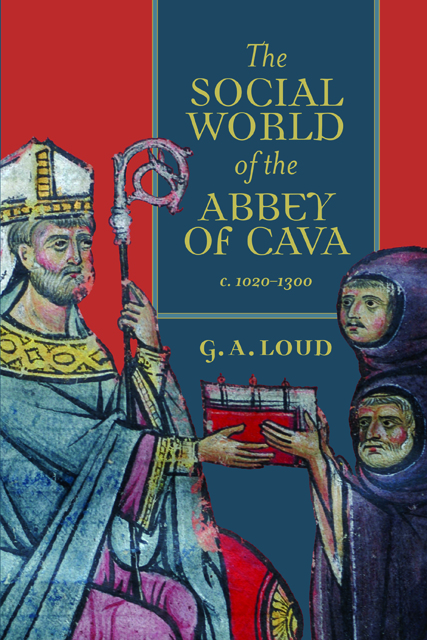Book contents
- Frontmatter
- Dedication
- Contents
- List of Maps and Charts
- Acknowledgements
- List of Abbreviations
- Note on the Organisation and Publication of the Cava Archive
- Dates
- Currency, Weights and Measures
- The Abbots of Cava, c. 1020-1300
- Maps
- I The Family of Vivus Vicecomes
- Introduction
- Part I The Abbey of Cava
- Part II Society and Economy
- Conclusions
- Appendix: Purchase and Expenditure by the Abbey of Cava, at Selected Periods between 1175 and 1230
- Bibliography
- Index
- Other volumes in Studies in the History of Medieval Religion
10 - Peasants, their Obligations and the Exploitation of Cava’s Lands
Published online by Cambridge University Press: 14 January 2023
- Frontmatter
- Dedication
- Contents
- List of Maps and Charts
- Acknowledgements
- List of Abbreviations
- Note on the Organisation and Publication of the Cava Archive
- Dates
- Currency, Weights and Measures
- The Abbots of Cava, c. 1020-1300
- Maps
- I The Family of Vivus Vicecomes
- Introduction
- Part I The Abbey of Cava
- Part II Society and Economy
- Conclusions
- Appendix: Purchase and Expenditure by the Abbey of Cava, at Selected Periods between 1175 and 1230
- Bibliography
- Index
- Other volumes in Studies in the History of Medieval Religion
Summary
The extensive property which Cava acquired needed to be put to use. To feed and clothe a large monastic community, to ensure the upkeep and repair of its buildings, let alone periodic new construction, and to acquire new property through purchase and buy off rival claims, all required large-scale resources of food and a substantial income. The same was true on a smaller scale for the subordinate priories, which were in addition, as we have seen, expected to make some financial contribution towards the mother house. We have so far discussed how Cava acquired and defended its property, but only occasionally and in passing how these lands were exploited. Yet this system of exploitation and economic management lay at the heart of the abbey’s social role, and the overwhelming majority of the people on whom it impinged, and who appear in its charters, were the peasants who were its tenants and dependents. How their labour underpinned the continued existence and prosperity of the abbey requires therefore extended analysis.
Leases
The agrarian economy of the principality of Salerno, and indeed of most of mainland southern Italy, during the central Middle Ages was overwhelmingly based upon lease-holding, rather than the direct exploitation of lands through hired or servile labour. This system of exploitation was already well established by the time of Cava’s foundation, and while some details may have altered, it remained essentially unchanged until c. 1300. Proprietors rented out portions of their property, usually in quite small parcels, to peasants who actually worked the land, or occasionally in the case of wealthier persons had these worked, paying each year a proportion of the crop to the landlord. Rents were largely in kind, although as the twelfth century wore on, some peasants also became liable for small extra payments, usually known as exenia or salutes, which might be in cash or kind, and were payable two or three times a year, mainly at Christmas and Easter. These would seem to have been a recognition of ownership, or perhaps a mark of lordship, but for most of Cava’s tenants their relationship with the abbey was a contractual one, into which they had entered of their own volition.
- Type
- Chapter
- Information
- The Social World of the Abbey of Cava, c. 1020-1300 , pp. 292 - 340Publisher: Boydell & BrewerPrint publication year: 2021



